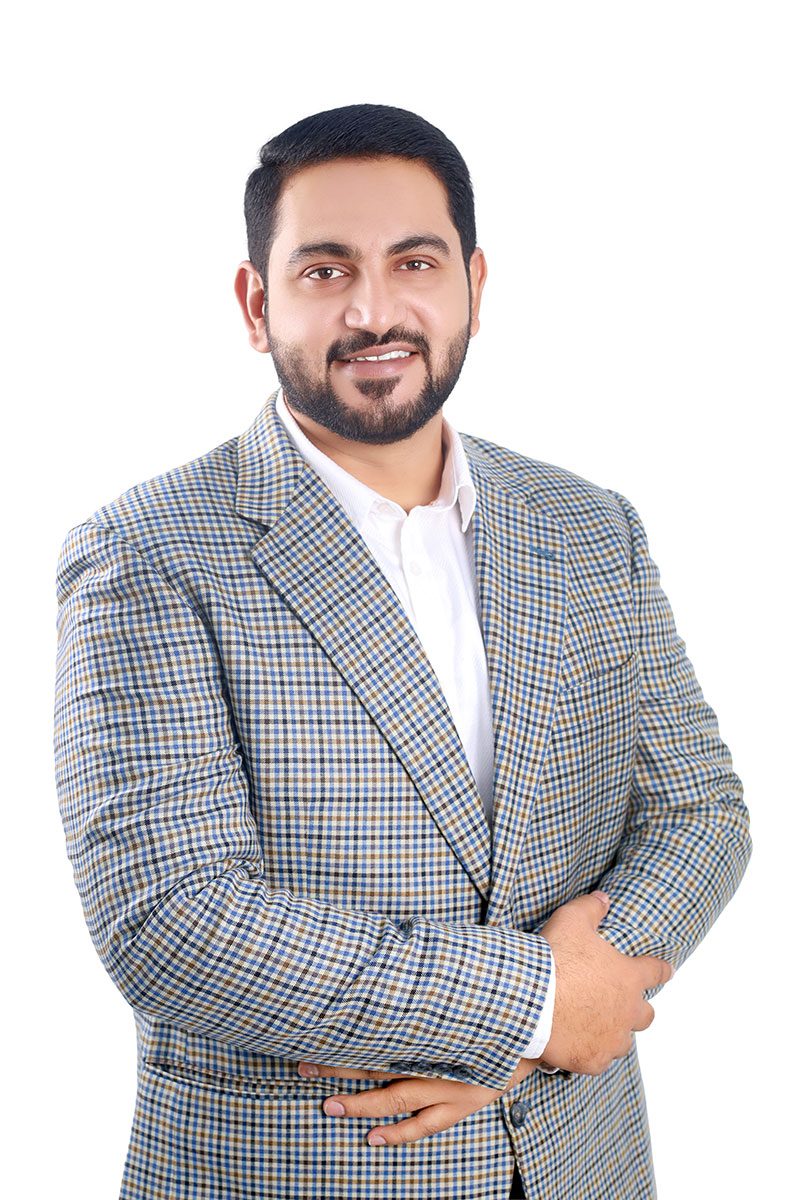Hello People »
Coding a career, designing a legacy
Tech architect, change-maker, and problem-solver with a global vision
By Team Vibe
Hailing from Hyderabad, Dr. Mohammed Kamran’s journey has been shaped by both passion and purpose. After completing his B.Tech and M.Tech at JNTU Hyderabad, he began his career in 2011 with Genpact, where curiosity and problem-solving defined his path. A few years later, he moved to the UAE, stepping into larger opportunities and tougher challenges. In 2021, he earned his Ph.D. in Computer Science Engineering with a specialization in Artificial Intelligence from Bhagwant University, Ajmer. Today, as Technical Manager and Solution Design Architect with the Umm Al Quwain Government, he has led the design and delivery of more than 300 Digital Services—driving innovation, improving efficiency, and creating meaningful impact in people’s lives.
Vibe onboards the dynamic Dr. Mohammed Kamran for a quick chat.
Please tell us a bit about yourself, your journey, and your experiences that have contributed to reaching where you are today.
I commenced my professional journey in 2011 in Hyderabad, India, as a Technical Associate at Genpact, supporting a US-based client until 2014. This role provided me with a solid foundation and ignited my passion for pursuing a long-term career in technology. In 2015, I sought opportunities beyond India and relocated to the UAE on a visit visa to identify the right position. In March of that year, I was appointed as an Oracle Apps DBA with the Umm Al Quwain Government. Since then, I have advanced within the organization and currently hold the position of Technical Manager for Software Development and Solution Design Architect. Throughout my tenure, I have successfully delivered over 300 services to the UAQ Government, contributing to cost savings amounting to nearly AED 11 million in the last two years. This experience has been both challenging and rewarding, significantly shaping my professional development.

What are the key elements you consider when leading a successful business and IT transformation initiative in a global organization?
A successful business and IT transformation hinges on six critical elements. First, establishing a clear vision that aligns with the organization’s strategic objectives. Second, ensuring robust stakeholder engagement, recognizing that success depends on people as much as on systems. Third, implementing effective change management to facilitate user adoption of new processes. Fourth, selecting scalable and secure technologies that support long-term growth. Fifth, making informed decisions grounded in reliable data and key performance indicators (KPIs). Finally, embedding agility into the transformation process to accommodate rapidly shifting priorities within global organizations. In essence, success is achieved by integrating strategy, technology, and people to create sustainable impact.
How do you foster high performance and collaboration in cross-functional, matrixed teams across geographies?
Fostering high performance in cross-functional, matrixed teams starts with clarity. Everyone needs to know the overall objective, their role in it, and how success will be measured. I make sure goals are transparent and aligned, so even if people are spread across geographies, they’re working toward the same outcome.
Second, I focus on building trust and communication. In global teams, misalignment often comes from assumptions or lack of context. I encourage open updates, use collaboration tools effectively, and create forums where people can raise issues early without hesitation. Third, I try to leverage diversity. Different regions bring different strengths and perspectives – rather than seeing distance as a barrier, I see it as an opportunity to innovate. Finally, I drive accountability with empowerment. Teams perform best when they own their piece of the puzzle but also feel supported. I set clear expectations, track KPIs, but also give them the autonomy to solve problems their way. In practice, this mix of clarity, trust, and empowerment helps turn a matrixed structure into a strength instead of a challenge.
If there is some advice you could give to your younger self, what would that be and why?
If I could give advice to my younger self, I’d say: be patient, but stay consistent. Early in my career, I was always in a rush to achieve the next milestone, but I’ve learned that real growth takes time and persistence. Every project, even the tough ones, teaches you something that compounds over the years. I’d also remind myself to focus more on building relationships. Technical skills open doors, but collaboration, trust, and the ability to influence people are what sustain a career long term. Why? Because looking back, the moments I grew the most weren’t when things went smoothly; they were when I stayed patient through challenges, learned from them, and worked with others to turn them into successes.
